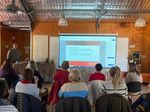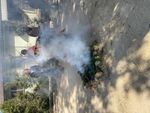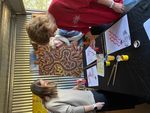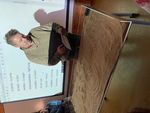KINDYARN - The Hills Community ...
←
→
Page content transcription
If your browser does not render page correctly, please read the page content below
KINDYARN
AUGUST 2020
From the Management Committee
Hello Hills Community Kindergarten families!
I am so pleased to report a quick summary of the driveway photo fundraiser that took place towards the
end of Term 2.
Firstly, a big THANK YOU to the families who took part in this very unconventional fundraiser. I am thrilled
to let you know all of the photos turned out beautifully, and it was such a privilege to have met, and spent
time with each participating family.
The feedback was incredibly positive, with many finding it hard to keep their image selections to a total of
5, some purchasing extra images, some their full gallery (20+ images), some opted to have profession-
al prints made, and one lovely mum shared that she is having some images enlarged for their home!
So in saying this, I am happy to report the driveway fundraiser raised a total of $835 for the preschool. An
incredible outcome for our amazing community kindergarten.
Thanks again for your participation,
Amanda Lau
(General Committee Member and Photographer)
Featuring …..The Evans Family Driveway Portrait
1Portfolios and goal setting
Thank you for taking the time to look through your child’s portfolio and provide feedback via the All about
me form. This year we have outlined goals for learning and development based on the time spent observ-
ing, engaging and planning for your child throughout the first part of the year. Partnering with families is a
service goal and we are continually reflecting on the ways in which we build these partnerships. The goal
setting is a great way to work together, whether your child is moving on to school or returning next year,
there is always a space for growth and development and most importantly opportunities to build on your
child’s learning. The approach of working together promotes high quality outcomes for your child in the
context of their early year’s education at preschool.
We had planned to host a school readiness evening but due to COVID19 are unable to. Below is some in-
formation about getting school ‘ready’ from a previous information session with a Kindergarten teacher at
a local school.
What is School Readiness?
School readiness refers to whether a child is ready to make a successful transition into school.
School Readiness includes: Self-care skills, attention and concentration, fine and gross motor development, play
and social Skills, emotional regulation, language– both expressive and receptive, problem solving and resilience.
In preparing and adjusting to school your child will need to:
Attend 5 days per week in a rigid daily routine
Adhere to classroom rules and expectations, in a larger group
Be able to participate in talking and listening tasks, for extended periods
Be an independent learner
Be able to regulate their emotions
Be happy and willing to separate from parents
Look after their belongings and be self-sufficient e.g. putting jacket on and off, packing away belongings
Wait for their turn and share appropriately
How can I prepare my child for school?
You can help prepare your child by fostering their independence, reading aloud to your child, talk about making
friends, giving your child simple directions to follow, encouraging your child to draw pictures and tell stories
about them, practice writing their name, talk about letters, numbers, shapes and colours in your everyday con-
texts. It is best to talk about going to school closer to it occurring, at this stage walk past and talk about what the
children are doing when they are at school.
We look forward to working with you and your child with the goals set for learning and development. If you would
like more information about your child’s progress, you can contact your child’s lead educator or Mrs McCartney.
2Professional Development:
By Allison McCartney
Our staff development day this term was one of a kind. We ventured to Muru Mittigar at Rouse Hill on Monday 20th
July to engage in professional development about Aboriginal and Torres Strait Islander ways of knowing and being.
This is a goal on our Quality Improvement Plan (QIP), as we continually find ways to authentically connect and embed
our history and culture. We began with a smoking ceremony led by our educator Wayne. He shared stories with us
about the sun, mother earth and the sky. We learnt about the history of government policies and the disadvantages
Aboriginals faced during colonisation and those that occur today. We heard stories of how we can help one another
and promote kindness to all. We explored sand drawing and painting stories using aboriginal symbols.
We can’t change the past, but we can change the future, we want to use our knowledge and understanding to promote
awareness of culture to our pre-schoolers.
Did you know we have established our own ways of acknowledging country at preschool. Mrs Hudd shares
the Rose Room’s Acknowledgement of Country...
Let’s put our hands on the land and thank the land - ‘thank you land’ (the children say). This is Darug land
and it has been here for thousands and thousands of years and we need to look after it.
Let’s put our hands in the air. What kind of day do we have today? – ‘a sunny day….a cloudy?’ (the children
say) – ‘thank you sunny day’ ‘thank you cloudy day’
Let’s put our hands on our hearts, how great that we are here, Let’s thank ourselves- ‘thank you self’ (the
children say)
Let’s put our hands on our friends, how great that we are here altogether, let’s thank our friends – ‘thank you
friends’ (the children say)
Learning about the history
Sand drawing
Smoking Ceremony Boomerang throwing Painting stories
Our Philosophy outlines We are continually working towards developing our own and the children and families’
understanding of Aboriginal and Torres Strait Islander culture through embedding learning into our planning
and the environment. We believe this is the way in which children gain an in depth understanding of the history
and future of Aboriginal and Torres Strait Islander Peoples. We aim to develop authentic partnerships within our
community and embrace the historical impact of the Darug people and be active participants in reconciliation.
3Unpacking a new parenting concept—‘Serve and return’
By Allison McCartney
I have recently been engaging in some reading and research regarding brain development and parent and
child relationships and interactions. This concept of Serve and Return is summarised below. You can seek
further information about this by visiting https://developingchild.harvard.edu/science/key-concepts/serve-
and-return/ or listening to the Podcast titled The Brain Architects
Serve and Return explains the important back and forth interactions between
children and adults that care from them, it begins from early on in life. It is the
exchange of communication, both verbally and non-verbally.
We are biologically wired to be engaged in this type of interaction. It starts
from birth e.g. eye contact, smiling, a crying child receives a response from
parent/carer to be fed, changed or to be settled to sleep.
The interactions adults have with children are critical as our brain is wired to
give and receive this type of back and forth interaction. Our brain becomes
wired through repeated interactions and experiences which build synapses.
When we don’t have opportunities to engage in these critical moments and
interactions our brain ‘prunes’ itself.
How does Serve and Return help with brain development?
It helps shape and model brain connections
If the brain doesn’t get this type of interaction it increases stress
factors, particularly in babies and it is biologically dangerous. It is
important to get to know your baby and child to know how they
respond to your interactions and different experiences so in turn,
you can support the child’s emotional responses and communica-
tion.
It is important that the time you do spend together involves quality interactions e.g. eye contact, being present,
speaking and listening. These moments of ‘serve and return’ can happen in seconds, in the context of your routines
- eating together, driving in the car, doing the shopping etc.
Another opportunity to ‘return’ the serve to your child could be when they are curious and ask questions. Instead
of giving direct answers, ask open ended questions such as “What do you think?, Why? How could we find out
more?” This shows you are interested and meets their curiosity or interest and promotes you to engage with them.
You can share what you think and why, whilst promoting that we are continually learning and seeking answers,
even as adults. We learn each day from our experiences, from people around us and through the interactions that
occur in various environments.
Serve and return should begin with the child. Notice your child and what they are ‘serving’ and then respond. This
notion of ‘serve and return’ builds positive relationships and helps parents and children engage and understand
more about one another. This doesn’t mean it occurs in every situation, there will be times that adults need to
make decisions and seek children to comply with this.
Here’s an experience to try...
Next time you arrive to collect your child from preschool- engage with them by greeting and looking at
them. This role models that you see them, demonstrates how to greet another person and builds path-
ways that they are respected and cared about. This may then open conversations about their day and
create a positive mood as your depart preschool.
4Carpark Safety
A friendly reminder to parents and carers whom utilise the carpark at Alfred Henry Whaling Reserve to ensure
you park in the allocated spaces only. If there is no parking available please use the side streets or park on the
opposite side of the reserve and use the path to walk up to the Kindergarten. Ensure you follow the signposted
areas for NO PARKING and BUS ZONE.
We also remind parents that if you have a younger child asleep in the car to please call the office for us to
transport your child up to you, this is part of our duty of care. It is an offence to leave children in the car and
brings with it a hefty fine. https://www.kidsafensw.org/road-safety/kids-unattended-in-cars/
Library Borrowing
It was with great excitement that we com-
menced library borrowing this term. The chil-
dren were very keen to bring their library
bags and borrow a book from our preschool
library to take home for the week!
This new routine promotes a love of reading
books at home and a sense of responsibility as
the children take care of their book and re-
member to return it safely the following
week.
We also have some keen volunteer parents to
help out with library, which is the essence of
our community kindergarten.
Library days and parent volunteers:
Tue– MT Class with Emma Pearson
Wed– MTW Classes with Simon Sackson and Lore-
na Brooks
Thu– WTF Class with Vijay Vajiaratnam
Fri– TF Classes with Katie Rae and Jacinta Veitch
5Fundraiser
We are limited with the types and amounts of fundraising we can do this year, with limited ways to
gather and join together as a community. We are continuing to raise funds to purchase some Aboriginal
and Torres Strait islander resources which links to our Quality Improvement Plan and recent profession-
al development.
Picture Plates is an
opportunity to cre-
ate a lasting
memory of your
child’s creativity.
Information about
this fundraising
event will be distrib-
uted on your child’s
library day next
week. Please collect
a template from the
office and you can
You can select a template to create a plate, clock, water bottle, tote bag, mug, pencil case or calen- also get siblings in-
dar. Items are priced between $18-$28 depending on product you would like artwork transferred to. volved.
Orders due back on 14th September, delivery will be around early December– a great gift
DATES TO REMEMBER
Preschool photos – MT / MTW classes Tues 8th September
- WTF / TF classes Thurs 10th September
Last day of Term 3 – Friday 25th September
First day of Term 4 – Monday 12th October
We appreciate parents continuing to arrive and depart
swiftly from the Kindergarten. Please continue to prac-
tice social distancing when talking to educators or other
parents. Children are to stay home if showing any signs
or symptoms of cold, flu or respiratory illness. As per
NSW Health guidelines if your child has undergone
COVID testing or have been a close contact they are
not to attend preschool until they receive a negative re-
sult. If your child is sent home with symptoms please
provide clearance from a GP or proof of negative result
before returning to preschool. This is to ensure the safe-
ty of everyone.
Thank you Tracey (Cassie’s Mum MT Class)
for donating some more hand sanitiser.
6You can also read



























































